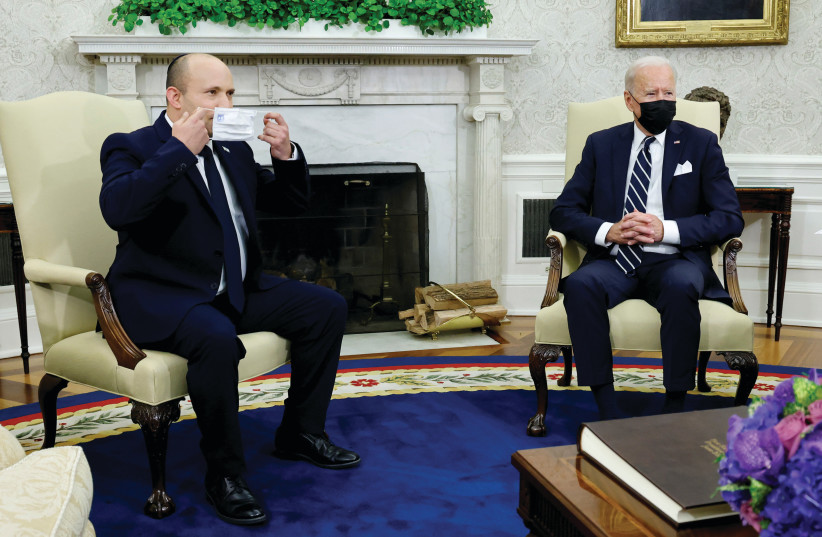When US President Joe Biden received Prime Minister Naftali Bennett at the White House a month ago, both leaders were eager to emphasize the strength of the US-Israel alliance and the warm rapport between them, with Bennett repeatedly affirming a “new spirit” in the relationship and Biden remarking “we have become good friends.” But do expressions of good will and demonstrations of positive personal chemistry suffice?
Like Bennett, Foreign Minister Yair Lapid appears to have built an effective connection with his American counterpart, US Secretary of State Antony Blinken, as has Defense Minister Benny Gantz with US Defense Secretary Lloyd Austin. This is good news, as a healthy relationship at the top augments the institutional ties between bureaucracies and can be especially beneficial in times of crisis.
Last May, during Operation Guardian of the Walls in Gaza, the four-decade-long friendship between Biden and Benjamin Netanyahu helped advance the US-Israeli understandings that enabled Israel to achieve its operational goals and enter a ceasefire at an opportune moment. Biden stated publicly that in all the years they have known each other, Netanyahu never lied to him. That personal trust proved to be a strategic asset.

Bennett’s familiarity with the Amtrak line from New York to Delaware may be a good icebreaker, and his American English an advantage, but the prime minister is not necessarily a natural partner for the current White House occupant. Not only do three decades in age separate the two, but Bennett’s record of right-wing politics, his Thatcherite economic philosophy and his historic support for the settlements do not necessarily endear him to the Democratic president.
Yet years and personality also separated Bill Clinton and Yitzhak Rabin, and they nevertheless built a strong rapport based upon mutual respect and a common agenda. Will Biden and Bennett be able to do the same in the two years Bennett has before he passes the premiership to Lapid?
What Bennett should not do is try to ingratiate himself with the president by automatically bowing to American wishes. Donald Trump may be out of the White House but nobody should be under any illusions; Washington will always put “America first” – and it is incumbent upon Bennett to do the same for Israel. The ultimate responsibility of every Israeli prime minister is for the security of the Jewish state, and while maintaining good relations with the US is a pivotal element in that, an Israeli prime minister needs to be firm with the Americans when the situation demands.
Of course, it can be appropriate for Jerusalem to go along with Washington’s requests, even when they involve a compromise on a legitimate Israeli national interest. In July 2000, Ehud Barak’s government acceded to the Clinton administration’s demands to cancel the sale of the Israeli Phalcon airborne radar system to China. This not only led to the loss of a very lucrative export deal, but the unilateral cancellation of a signed contract negatively impacted relations with China, and Israel had to pay the Chinese a significant sum in compensation. But Barak undoubtedly made the correct decision. He understood that the economic benefits from the sale were secondary when compared with the importance of Israel’s strategic alliance with America.
But it is not always warranted for an Israeli leader to go along with American wishes. David Ben-Gurion stood up to John Kennedy on Dimona inspections and in so doing risked a serious rupture in relations at a time when Israel was in a much weaker position than it is today. Golda Meir said “no” to the Nixon administration on the Rogers Plan which she thought would give the Arabs an Israeli commitment to a full withdrawal without receiving a full peace in return. Yitzhak Rabin rejected Henry Kissinger’s proposals for an Israeli disengagement in Sinai, leading to the “reassessment” crisis with the Ford administration. Menachem Begin faced military sanctions from the Reagan administration following Israel’s successful strike on Iraq’s Osirak nuclear reactor. Ariel Sharon did not call off Operation Defensive Shield in the West Bank in response to George W. Bush’s call to do so “without delay.” In all these cases Israeli prime ministers were convinced that a preeminent Israeli interest was at stake.
Having a public spat with Washington is never easy for an Israeli prime minister. It can play out badly with the Israeli electorate that expects the nation’s leadership to be a good custodian of Israel’s most important international partnership. In the 1992 election, Yitzhak Shamir paid the price for his strained relations with the administration of George H. W. Bush. Due to a disagreement over settlements, Shamir failed to receive American loan guarantees needed to support absorbing the massive wave of immigrants from the imploding Soviet Union.
Nevertheless, if an Israeli leader is seen to be fighting for a vital national interest, tensions in the relationship with Washington have been understood by the Israeli public. When, in the lead up to the 2015 election, Netanyahu spoke to Congress against the Obama administration’s nuclear deal with Iran, most experts agreed that it did not hurt him politically. On the contrary, it strengthened him with the voters.
It has often been said, and it is undoubtedly true, Israel has no better friend in the world than the US, and America has no better friend than Israel. Understandably, a new prime minister will always be wary about accusations of inexperience and of mismanaging his country’s paramount bilateral relationship. A prime minister who knows his time in office is limited could be reluctant to have his entire tenure overshadowed by tensions with the administration. But if Israel’s core national security is on the line, Bennett must be prepared to play hardball. For if an Israeli prime minister does not do so, no one else can effectively fill the void.
The writer was a senior adviser to the prime minister and is a visiting fellow at the INSS. Follow him at @AmbassadorMarkRegev on Facebook.
